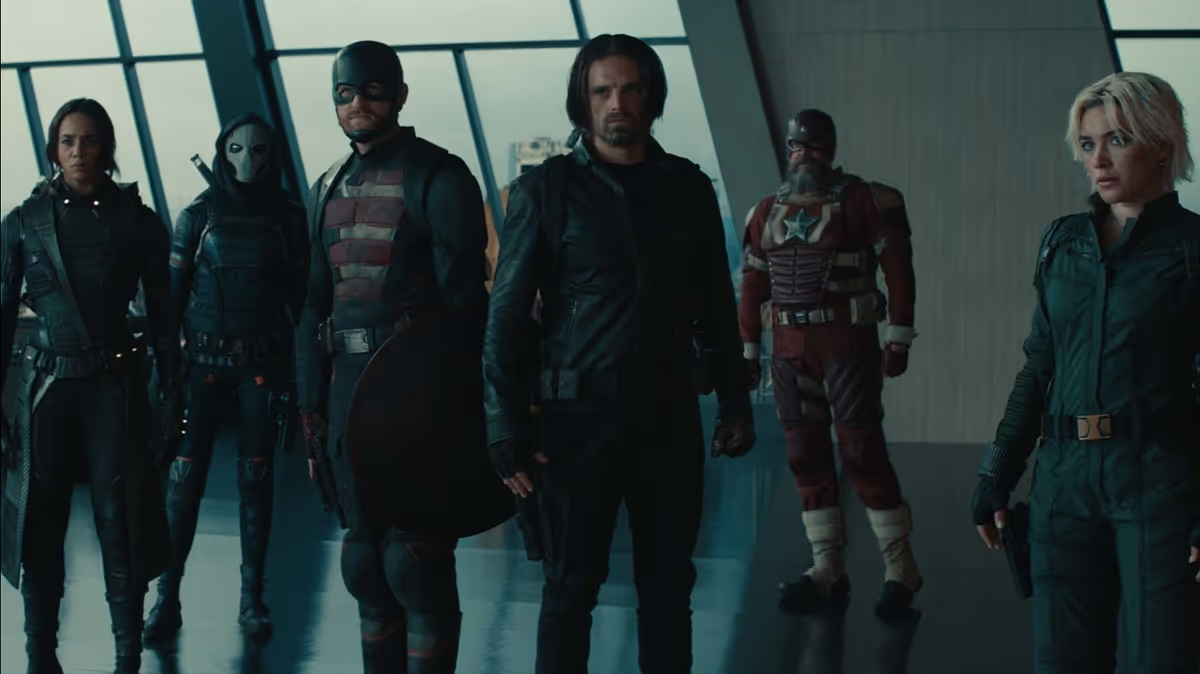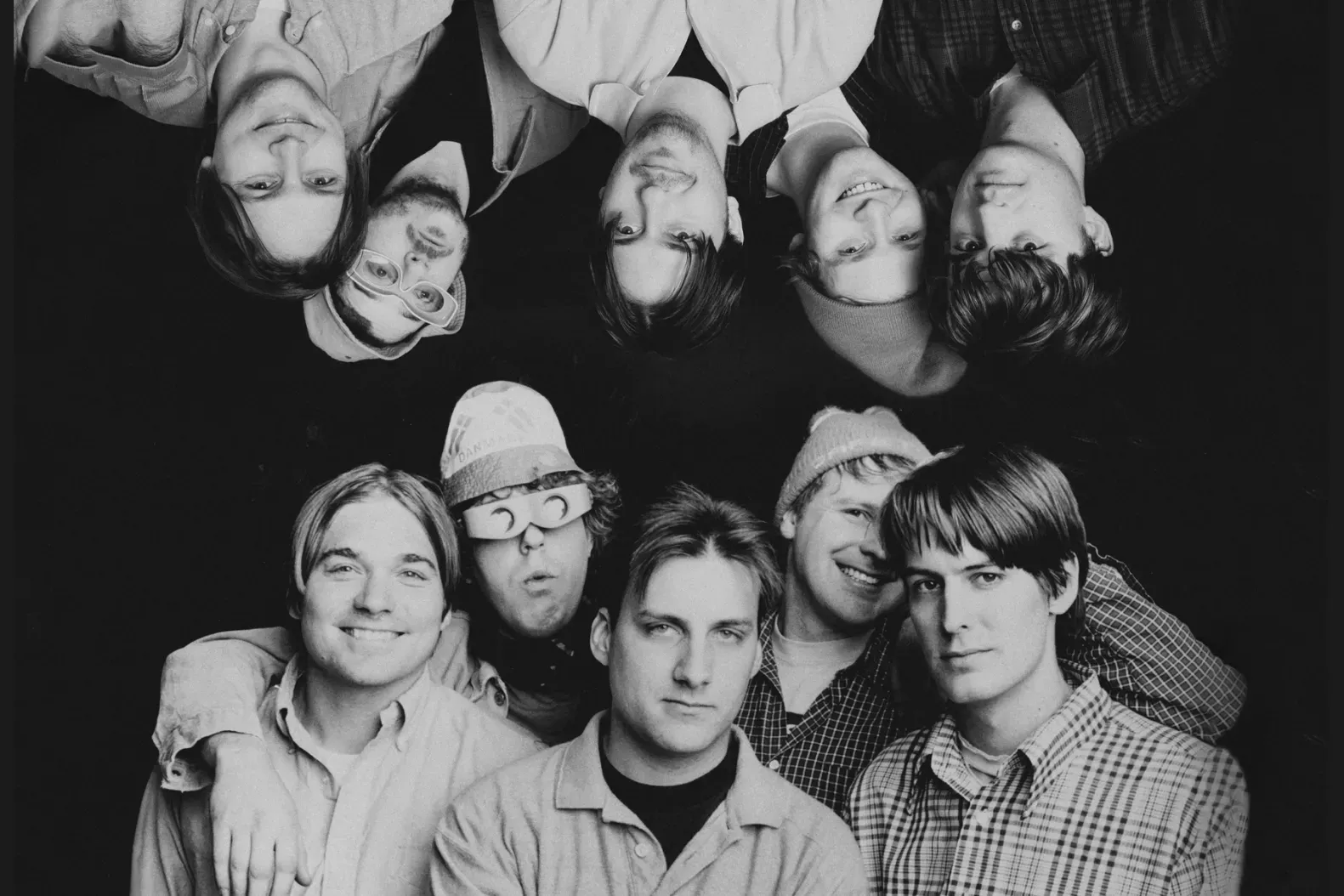In Review: 'Thunderbolts*.' 'The Surfer,' 'Pavements'

An underdog tale offers a different perspective on the MCU, Nicolas Cage battles a town of Australian toughs, and a seminal '90s band gets a rock-doc, biopic, and jukebox musical all rolled into one.
Thunderbolts*
Dir. Jake Schreier
126 min.
You might be tired of the Marvel Cinematic Universe but that’s okay. So are most of the characters in Thunderbolts*, the latest MCU entry. That’s especially true of the former Black Widow assassin Yelena Bolova (Florence Pugh) who, as the film opens, has started to teeter into despair. It’s not hard to see why, either. She hasn’t spoken to her father Alexei (David Harbour), the former state-sponsored hero of the U.S.S.R., in a year. And she misses her sister Natasha, who died a hero’s death. As for Yelena, she spends her days doing mop-up jobs for Valentina Allegra de Fontaine (Julia Louis-Dreyfus), the deeply shady CIA chief who’s in the process of undergoing a seemingly endless congressional investigation, partly led by freshman congressman/former Winter Soldier Bucky Barnes (Sebastian Stan). Is Yelena even one of the good guys? Would knowing she was one of the good guys cure the aching in her soul?
Maybe become a paid subscriber? It'd be cool!
The MCU of Thunderbolts* is, in what plays like a self-aware touch, a post-heroic age of faded glories. It’s the best MCU film in a while, in part because it often plays like an anti-MCU film. There are no Avengers around to save the world but, the occasional hulked-out president aside, there don’t seem to be many threats requiring superheroes, either. Yelena operates in a morally dubious gray area. His (somewhat questionable) skills no longer needed, Alexei makes a meager living as a limo driver. But at least they’re doing marginally better than John Walker (Wyatt Russell), the publicly disgraced pseudo-Captain America or past MCU adversaries Ghost (Hannah John-Kamen) and Taskmaster (Olga Kurylenko). Like Yelena, they’ve been pressed into the service of Valentina’s shadowy agenda. And when Walker, Ghost, Taskmaster, and Yelena all find themselves stuck in the same underground facility, they come to a revelation: they’ve all been sent to the same place so Valentina can tie up some loose ends by killing them. They’re joined by Bob (Lewis Pullman), a friendly, spacey, but clearly troubled guy who has no idea how he ended up in their company and will seemingly be collateral damage if they don’t band together to survive.
Directed by Jake Schreier (Robot & Frank) from a script by MCU veteran Eric Pearson and Joanna Calo (whose many TV credits include Bojack Horseman and The Bear), Thunderbolts* sets itself apart from other MCU ventures almost immediately by following a grippingly choreographed fight scene with a wittily scripted exchange that takes the story in an unexpected direction, a pattern the rest of the film sustains. That it doesn’t lose focus of Yelena’s inner turmoil confirms that the film wants to be about more than jokes and superhero action. That also mostly works out. Since David Gordon Green’s Halloween, it’s become easy to scoff at genre films making superficial gestures at addressing the damage done to their central characters, especially since so many make it an afterthought. Thunderbolts* never gets more complicated than a pop psychology paperback in considering its characters’ inner lives, but the emphasis carves out room for thoughtful performances (Pugh’s an obvious standout, but everyone has their moments) and a visually creative climactic conflict that puts aside the usual explosions. It gets those out of the way earlier. Even a misfit film about misfit heroes has to play by some of the rules. —Keith Phipps


The Surfer
Dir. Lorcan Finnegan
99 min.
What if Nicolas Roeg had directed Straw Dogs? It might have looked a lot like Lorcan Finnegan’s The Surfer, though that elevator pitch isn’t terribly fair to this eccentric, suffocating psychological thriller, which compels and repels in roughly equal measure. Finnegan doesn’t approach the theme of masculinity with the same brute force of Sam Peckinpah’s direction of Straw Dogs, but he doesn’t exactly let the audience off the hook, either. To watch the film is to experience the escalating trials of a middle-aged man who slowly loses his material and mental possessions, and it can feel like knocking your chin on every rung down the ladder. It’s not exactly an insult to think that this 99-minute film seems twice as long to experience, more a testament to Finnegan’s commitment to holding his hero—and the audience—in confinement like a zoo animal. As with Peckinpah’s home invasion film, it seems the only way out is through.
Where Dustin Hoffman in Straw Dogs has to protect his home from attack, Nicolas Cage in The Surfer has to weather hostilities in order to get the seaside home he insists on buying. An ideally cast Cage plays the unnamed figure of the title—the stylized opening credits read “Nicolas Cage is The Surfer—who takes his teenage son out of school to show him a gorgeous surfing spot on Australia’s Lunar Bay. He has a surprise for the boy: If he can piece together the complicated financials, he has a chance to buy back the house, which is where he grew up. But when the pair descend to the beach from the parking lot with their boards, they’re told in no uncertain terms that the spot is for locals only. The leader of the gang, Scally (Julian McMahon), intends to enforce this dictum with relentless brutality and intimidation.
That’s enough to scare off the son, but Cage’s surfer refuses to be moved off the spot, even as men like a local police officer and a pop-up shop barista join the conspiracy against him. Much like Finnegan’s 2019 film Vivarium, a sci-fi puzzle-box that takes place in a suburbia of infinite identical blocks, The Surfer traps Cage in a location that seems inescapable, even if he wanted to leave. The campaign of humiliation and suffering that Scally launches against the surfer brings out the best in Cage, who’s gradually reduced to a vagabond, living out of a broken-down station wagon and sipping puddle water. The twist to all these hardships is a bit of a groaner, but The Surfer breaks down its upwardly mobile hero to his core, to discover what kind of man he really is. Finnegan’s perspective on this masculine duel doesn’t align with Peckinpah’s, and neither does his style, which is more elliptical than muscular. But The Surfer confronts the audience with the same blunt questions of manhood and what can be gained by asserting it. — Scott Tobias (3.5/5)


Pavements
Dir. Alex Ross Perry
128 min.
“I thought it was supposed to be fake. But it’s real,” Scott Kannberg, the Pavement guitarist sometimes known as Spiral Stairs, says as he walks into a pop-up New York museum exhibition dedicated to his band. He’s sort of right. The space contains plenty of real Pavement relics alongside items of more questionable origin. Elsewhere in Pavements, director Alex Ross Perry’s appropriately less-than-straightforward documentary about the quintessential ‘90s indie rock band, lead singer Stephen Malkmus walks through the exhibit with a television journalist (or “television journalist”), guiding her through a space that includes a corner dedicated to Pavement’s advertising: a “Think Different” ad for Apple; an Absolut Vodka ad built around the cover art for the band’s third album, Wowee Zowee; a “Read” poster for the American Library Association. Malkmus isn’t quite so proud of these sell-out moves. Though they might sound familiar, these objects are on loan from the Mandela Effect universe, where they coexist with the Sinbad movie Shazaam and Jiffy Peanut Butter.
Freely mixing fact and fiction, Perry’s hybrid documentary is a bit like what it must have been like to visit the Pavement museum. Edited by Robert Greene (Perry’s regular editor but also the director of his own innovative documentaries like Bisbee ‘17), Pavements sometimes flits between four different strands exploring Pavement’s history, and sometimes lets them overlap and blur. Ostensibly part of a flood of activity celebrating the 2022 reunion of “the world’s most important & influential band,” Pavements includes relatively straightforward interviews and archival, rehearsal and concert footage alongside scenes from the museum and looks at the creation of two other Pavement offshoots (both also directed by Perry): the jukebox musical Slanted! Enchanted!: A Pavement Musical, and Range Life, a “big-budget Hollywood biopic” focusing on the group’s turbulent middle years that climaxes with West Virginia Lollapalooza attendees pelting them with mud. (Stranger Things star Joe Keery plays Malkmus and cites Bohemian Rhapsody as aspirational.)
Somehow all this works remarkably well as an informative recounting of the band’s history, a reality-bending experiment, and a distillation of the Pavement spirit, in which irony masquerading as earnestness could sometimes serve as cover for a subterranean sincerity. Absurd as the setting might be, the glimpses we get of Slanted! Enchanted!, which was staged three times as a workshop in 2022, are bizarre, stirring, and kind of moving. The Range Life scenes, presented as part of a full-length movie that (probably) doesn’t exist, leave no rock biopic cliché untouched. But they also dramatize some of the real tensions and contradictions of the band’s mid-’90s existence and the difficulty of repeatedly shrugging off the potentially image-ruining next-big-thing label while still remaining a viable enterprise. In the end, they couldn’t, breaking up as the ’90s, the decade they helped define and reflect, drew to a close. But that wasn’t really the end. Reunions aside, the music lived on. In another moment taken from the museum opening, the members of Pavement look on as acts like Soccer Mommy, Snail Mail, and Bully play spirited covers from the band’s catalog. Their appreciative grins look undeniably real. —Keith Phipps


Discussion